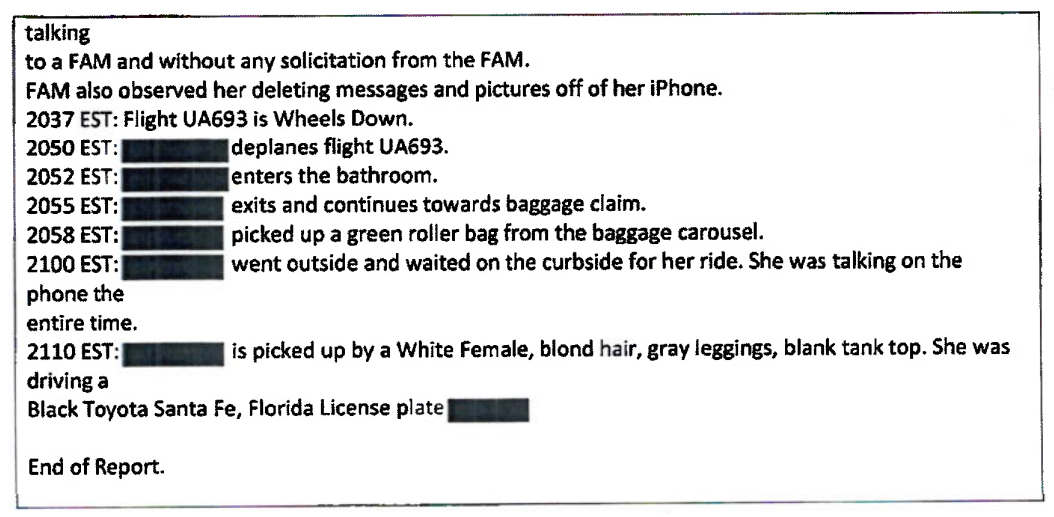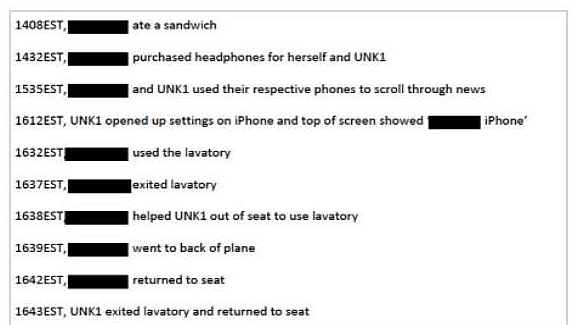The weaponization of travel blacklists

[A Federal Air Marshal (FAM) tasked with surveillance of an airline passenger targeted by Quiet Skies lists and/or rules followed the traveler out to the curb and recorded the license plate number of the vehicle in which she left the airport, so that her airline reservations could be integrated with license plate reader data into an uninterrupted multi-modal travel history.]
Coming just hours before the partial shutdown of Federal government operations, this hearing was sparsely attended, even by members of the committee, and got little press attention. The hearing opened with the Chair and Ranking Minority Member of the committee talking over each other at length.
Much of the argument between Senators and the questioning of witnesses focused not on the general problems of the Quiet Skies traveler surveillance program program or government travel blacklists (referred to euphemistically as “watchlists” throughout the hearing) but on whether these programs have been weaponized to a greater extent under Democratic or Republican administrations.
But if we — and, we hope, members of Congress — can look past the partisan polemics, the testimony and documents introduced into the record of this hearing provide important guidance on what can and should be done to protect all travelers — regardless of our party affiliation (if any), ethnicity, religious beliefs, or political opinions — against the weaponization of travel blacklists by whatever government is in power.
The Quiet Skies [sic] program assigned officers from the Federal Air Marshals Service (one of the police agencies within the Transportation Security Administration) to accompany and surveil pre-selected airline passengers on flights and in airports.
Quiet Skies is just one of many travel surveillance and blacklisting programs. According to another report by the same Senate committee last yea (under a chair from the opposite side of the aisle), “There are at least 22 different mechanisms that might lead Americans to receive additional screening at airports and other ports of entry or be denied the ability to travel.”
According to previous whistleblower reports and documents obtained by the Senate HSGAC Committee and entered into the record of the hearing last week, Quiet Skies targets were selected by a ruleset that incorporated other US government blacklists and watchlists as well as profile-based rules that factored in ethnicity and countries previously visited.

[Redacted excerpt from a trip report by a Federal Air Marshal regarding a subject targeted through the Quiet Skies program.]
The Quiet Skies program was ended in June 2025 by the Secretary of Homeland Security, Kristi Noehm. The same day as the Senate hearing on Quiet Skies last week, the TSA announced that Secretary Noehm was firing five senior TSA officials associated with the Quite Skies program, including the TSA’s executive assistant administrator for operations support and the deputy assistant administrator for intelligence and analysis.
News reports, presumably based on DHS statements, described Quiet Skies as a “Biden-era” program even though its largest expansion came in 2018 during the first Trump administration. And according to the TSA’s press release last week:
The TSA administrator has legal authority to prevent an individual from boarding an aircraft, task Federal Air Marshals with surveilling an individual, or place them on a watchlist, but it is only intended to be used to track and prevent dangerous criminals and terrorists from carrying out attacks on Americans.
We question whether the TSA Administrator has the authority to prevent someone from traveling by common carrier without getting an order from a judge. And the TSA and DHS have consistently asserted authority and exercised power — legally or not — to blacklist and surveil travelers without needing any suspicion of criminality.
The bipartisanship of violations of the right to travel through blacklisting and watchlisting was brought out in the response of Mr. Abed Ayoub, Executive Director of the American-Arab Anti-Discrimination Committee (ADC) to one of the Senators’ questions about the weaponization of watchlists and blacklists against disfavored groups and individuals:
That’s not a partisan problem. That’s a due process problem. When the government can quietly tag one group, it can quietly tag any group, left, right, neither, just depending on who holds power. The answer is the same for all of us: end the watchlists….
Quiet Skies captures only part of the story. It’s a window into a faulty surveillance architecture. The watchlist isn’t about who you vote for. It’s about whether the government has to prove its case when it takes away your rights….
Our community, for the past quarter of a century, we’re… targeted by all the administrations, so we can tell you the experience under Republican and Democratic administrations.
Further guidance about what Congress can and should do was provided by another of the witnesses, Mr. Jim Harper, a Senior Nonresident Fellow of the American Enterprise Institute:
We intuitively feel we have the right to travel, and there are cases from the Supreme Court that say you have a right to travel: You can move from one state to another and they can’t deny you Welfare benefits when you get there.
There are other cases: A man in San Francisco wanted to fly to Washington, DC, to meet with his Representative, and the 9th Circuit Court of Appeals said that you don’t have a right to travel on your preferred mode of transportation. They said, no, you can take the train, you can drive, if you want to go to Washington, DC.
A clear right to travel — Americans believe they have it, but the courts haven’t accorded it to them — would give them a position when they went to court.
Court cases challenging the no-fly list (ongoing since 2013, and now on remand following a unanimous favorable Supreme Court decision in 2024) and other travel blacklists and watchlists (ongoing since 2018) have been dragged out for years by the government. The government continues to claim that “merely” being delayed for a few hours or days isn’t sufficiently harmful to a traveler’s rights to provide a basis for a lawsuit.
The Freedom to Travel Act that was introduced in 2021 in the House of Representatives would provide both an explicit statutory right to travel by common carrier and a cause of action for violations of that right by government agencies, carriers, or other entities.
We hope Senators and Representatives moved to act on the issues raised in last week’s hearing on the TSA will re-introduce and co-sponsor the Freedom to Travel Act in this session of Congress, hold committee hearings on it, and incorporate it into appropriate omnibus legislation that has a better chance of passage than a standalone bill.
Pingback: 旅行黑名单的武器化 - 偏执的码农
Pingback: Hacker News 今日TOP 20| 2025-10-08 - 出海掘金,无限可能。为独立开发者、跨境电商从业者、海外自媒体提供最新出海资讯和资源-出海掘金,无限可能。为独立开发者、跨境电商从业者、海外自媒体
Pingback: The weaponization of travel blacklists - TOPNEWS
Discussion on Hacker News:
https://news.ycombinator.com/item?id=45515783
“TSA Agents Tailed Innocent Passengers for Years—Here’s An Absurd Trip Report They Filed” (by Gary Leff, View form the Wing, October 7, 2025):
https://viewfromthewing.com/tsa-agents-tailed-innocent-passengers-for-years-heres-an-absurd-trip-report-they-filed-roundup/
In America we have organized criminal activity taking place in nearly every city in the USA. This crime ring was exposed in the 1970’s. The exposed crimes included but were not limited to stalking, assaults, vandalism, theft, break ins, druggings, false imprisonment, judicial corruption, character assassination, career sabotage, financial sabotage, bribery, blackmail, extortion, intimidation, even the murders of American civilians!
This criminal organization was found to have been carrying out such crimes for decades in secrecy. The exposure of these crimes led to a investigation carried out by the Senates Church Committee.
This was the CIA, FBI, NSA, DOJ cointelpro operations which garnered the participation of law enforcement agencies and personnel nationwide.
Cointelpro was a simple abbreviation for the FBI’s counterintelligence surveillance programs.
Fast forward to 2001. Welcome into America the newly created Homeland Security, the patriot act, FISA 702, a nationwide network of FUSION CENTERS, and the new DOMESTIC SURVEILLANCE operations. The new homeland security branch along with the FBI and law enforcement agencies nationwide partnered with community watch groups, neighborhood watch groups, corporations, small businesses, the FBI’s privatized Infraguard, citizen corps, private and military contractors searching our cities for the ever elusive “domestic terrorist”.
Of course domestic surveillance operations are counterintelligence surveillance operations so it isn’t a surprise that as soon as the new operations began social media sites across America soon became outlets for Americans reporting systematic abuses carried out against them by the participants of domestic surveillance operations!
The civilians refer to themselves as targeted individuals, the crimes reported unsurprisingly are the same crimes reported in the decades of exposed cointelpro operations, the agencies and participants involved in domestic surveillance operations refer to targeted individuals as paranoid or delusional American civilians suffering from some persecutory disorder in what would be mass psychosis (which does not exist), unsurprisingly this is the same tactic used in the earlier illegal cointelpto operations to discredit the targets of the CIA, FBI, DOJ, NSA directed cointelpto operations.
The American civilians targeted in domestic surveillance operations have termed the organized surveillance as Gangstalking for it is carried out as psychological warfare as it was in the earlier operations in order to completely neutralize and destroy the target. The cointelpro operations were in fact stalking, psychological warfare, assassination operations. Once again this term is used to paint the targeted civilian as paranoid, delusional, mentally unfit.
Little has changed over the decades except for the size and scale of illegal operations carried out by these agencies. One can call them counterintelligence operations or if one prefers they can refer to them as domestic surveillance operations. They are in fact Cointelpto operations, the same illegal targeting operations exposed over half a century ago, carried out by the same agencies which are committing and directing the same crimes against the same civilians, activist, protesters who drew the attention of American local, state and federal agencies long ago corrupted and operating well outside of the boundaries of American law and our constitution.